
A review of tonight’s Atlanta coming up just as soon as I wear a white suit to a strip club…
“Money is an idea, man.” -Alfred
When actors create their own roles, they can either lean into what they’re known for doing, and know that they’re good at, or they can try to show a side of themselves that no one else has
With Atlanta, Donald Glover has definitely taken the latter approach. With very few exceptions, there’s nothing recognizable from the big, ridiculous material he played so well on Community or as part of Derrick Comedy. Earn isn’t always the show’s straight man, but he’s often a cool, detached observer of his own life, his primary function to dryly react to the insanity around him. He’s great at this as well, and has calibrated things so that even the tiniest change of expression can generate a big laugh when needed, but even a season-plus into the series, I occasionally find myself expecting some Troy Barnes to slip out, even though he’s clearly not coming to this party. And that’s okay, because Earn Marks is plenty funny, too.
If last week’s “Sportin’ Waves” was a perfect showcase for Brian Tyree Henry’s many looks of exasperation, then “Money Bag Shawty” was the same for Glover. It’s something of a flipside to last season’s “Go For Broke,” where Earn was scrambling to show Van a good time despite having only $62 to his name. Here, he finally has real money to spend — a chance to stunt on other people, instead of always being stunted on — thanks to the success of Paper Boi’s single, and still nothing goes as planned. The upscale movie theater won’t accept his $100 bill and treats him like a criminal. Ditto the manager at the hookah bar where he takes Van next, even though the cops escorting him out acknowledge that his money clearly isn’t counterfeit. The strip club to which he finally takes Van and the guys is only happy to take his money, but always more than expected, thanks to the ridiculous upcharges that come with doing virtually anything there.
It’s a marvelous, seemingly endless showcase for Glover to look bewildered, aggrieved, and eventually full of despair, and sets things up perfectly for the final failed stunt: disgraced, then quasi-redeemed NFL quarterback (and former dog fighting impresario) Michael Vick is racing guys for money outside the club, and Earn figures the former Pro Bowler will be just tired enough to lose to an amateur. Instead, we cut from the triumphant music and a freeze frame of Earn in motion to him looking despondent in the limo as Van tries to make him feel better by reminding him, “It’s Michael Vick!” (Even tired, even six years since he was a regular starting QB, he’s still one of the best/fastest athletes to ever play the position.)
There’s a sense of futility baked into Atlanta, where no matter how successful Paper Boi becomes, and no matter how much money Earn makes as his manager, things will never quite work out the way they want. It’s basic comic/dramatic tension. But the many ways in which things don’t work out are as surprising and fun as the understated character Donald Glover created for himself to play.
Some other thoughts:
* The opening bit with the video of the white Southern mom offended by Paper Boi’s lyrics — which backfires and turns into great viral marketing for the single — is a perfect little comic sketch, building and building to the punchline where the thing that upsets her the most by far isn’t the bad language, nor the talk of drugs or violence, but Paper Boi shouting out to a different former (for now, at least) NFL quarterback in Colin Kaepernick, who launched the whole movement of athletes kneeling during “The Star-Spangled Banner” to protest police violence and other issues. She can mostly keep it together through lines like “my dick is like a tree trunk,” but “Shout out Colin Kaepernick” is just more than she can handle.
* Paper Boi’s friend and rival Clark County returns, and though in many ways he represents the more successful and protected career that Al wants — down to the suggestion that he should drop Earn as his manager and get with Clark’s — he turns out to be someone who’s simply better at putting on a public face than Al, as his frustrations with the sound engineer’s technical problems eventually leads him to not-so-subtly order a beatdown for the poor guy. (Which is itself an echo of Al and Darius witnessing violence by their drug connect last season.) I’ll be very curious to see how (or if) this relationship evolves over the season.
* Though season two thus far feels more of a piece than a lot of season one did, Atlanta still isn’t particularly concerned with continuity or advancing stories incrementally in a way that most of its peers are. Van makes her first appearance of the season, and there’s no attempt to explain what’s happening with her on the job front and how she’s paying the rent, let alone for Beyonce tickets, despite that being a big deal late last season. The exposition’s not really necessary to anything that happens in this story, and if it becomes important again later, I’m sure we’ll hear about it. It’s just a different approach.
* Vick’s cameo is also a bit of a sequel to the invisible car gag from last season’s club-set episode.
What did everybody else think?
Alan Sepinwall may be reached at sepinwall@uproxx.com. He discusses television weekly on the TV Avalanche podcast. His new book, Breaking Bad 101, is on sale now.
